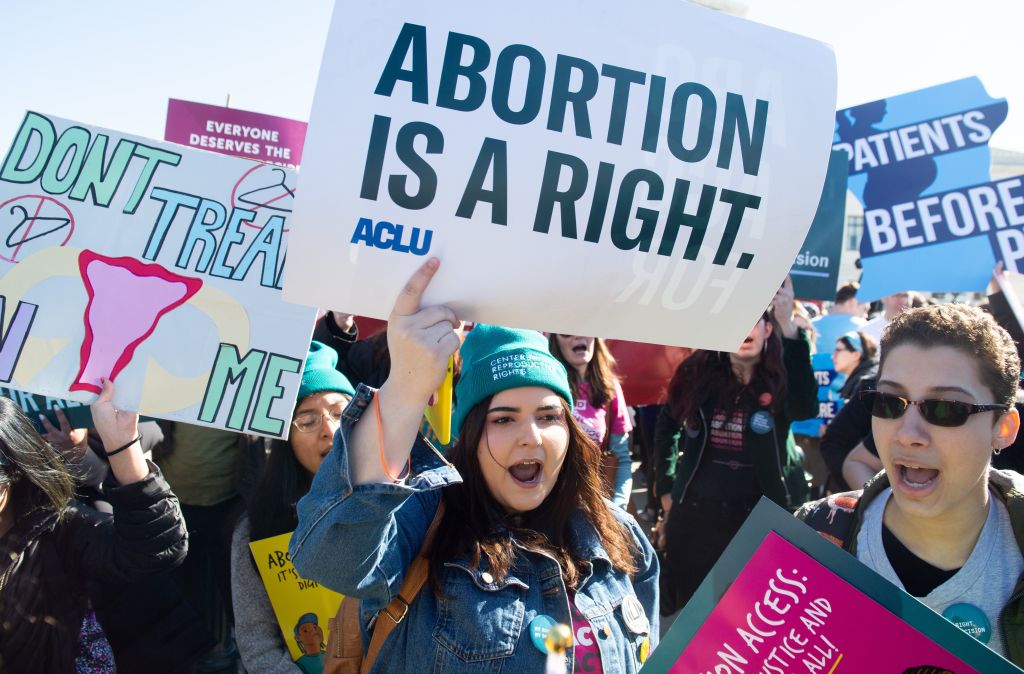
DOJ, 24 states seek court order to stop Texas’ new ‘heartbeat’ bill
The new policy bans abortion procedures as soon as a heartbeat is detected in the fetus, which usually occurs after six weeks of pregnancy.
Late in the afternoon on Tuesday, Sept. 14, the U.S. Justice Department sought an immediate court order to prohibit Texas from enforcing its restrictive new law that effectively bans most abortions.
In addition to outlawing abortion as early as six weeks into a pregnancy — before the majority of people know they're pregnant — the measure, S.B. 8, also permits private citizens to bring civil lawsuits against abortion providers, or anyone who helps a person access the procedure.
Those found in violation of the law are required to pay at least $10,000 to the person who successfully brought the suit.
Republican Governor Greg Abbott signed the measure into law in May, and Texas joined dozens of other states that have passed legislation banning abortions at early stages of pregnancy. These measures are known as “heartbeat bills,” as they intend to ban the procedures as soon as a fetal heartbeat is detectable.
After the ban took effect earlier this month, Attorney General Merrick Garland released a statement vowing that the Justice Department would “continue to protect” the safety of those in Texas seeking abortions.
President Biden referred to the law as “extreme” in a statement and said it violates Roe v. Wade, which protects the rights to reproductive freedom and autonomy.
On Tuesday, the DOJ said that if an order is granted, the law should not only not be enforced while it’s in place, but those who try to enforce it should also be informed that they no longer have the authority to do so.
The request was filed in the U.S District Court for the Western District of Texas and it states that the law is unconstitutional and is an “unprecedented scheme” that aims to deny women and healthcare providers the ability to challenge the statute in federal court.
The department is requesting a restraining order or preliminary injunction to “protect the constitutional rights of women in Texas,” the interests of the U.S. in adhering to the Constitution, and federal agencies and employees whose lawful actions would be prohibited by the law.
NEW: The Department of Justice just submitted an emergency motion to temporarily block Texas's ban on abortions after six weeks. https://t.co/rD1wui0Xvq
— MeidasTouch.com (@MeidasTouch) September 15, 2021
The department filed a lawsuit against the state’s ban on all abortions after cardiac activity is detected in the fetus, which happens before most women discover they are pregnant. It makes no exceptions for cases of sexual assault or incest.
The U.S. Supreme Court declined to block the law and it went into effect on Sept. 1.
RELATED CONTENT
On Monday, Sept. 13, Judge Karin Crump of the 250th District Court issued an order that temporarily blocked the anti-abortion group Texas Right to Life from suing the Planned Parenthood of Texas and its abortion providers under S.B. 8.
Crump ruled that the group cannot file suit against Planned Parenthood until a final judgment has been entered into the Department of Justice lawsuit.
Update in Texas: @TheJusticeDept has requested a restraining order that would stop — temporarily — the enforcement of the state’s 6 week abortion ban. We welcome this as a first step in restoring abortion access in Texas. https://t.co/YJXADUaTKp
— Planned Parenthood (@PPFA) September 15, 2021
She also found that Planned Parenthood could suffer lasting harm without the injunction and that the Justice Department will likely triumph in its suit, which could potentially block the law permanently. Judge Crump set a trial date of April 4, 2022.
Oregon and 23 other states, including Hawaii, Maine, Illinois, Massachusetts and New Mexico, have joined the Department of Justice in their efforts to challenge the abortion ban.
Oregon Attorney General Elen Rosenblum filed an amicus brief on Wednesday, Sept. 15, putting Oregon’s support behind the Justice Department’s motion for an injunction to stop the new law immediately.
“This anti-abortion law is unequivocally unconstitutional. By turning private citizens into ‘bounty hunters’ targeting anyone, including medical professionals, who assist someone in obtaining an abortion, Texas is ignoring well-established legal rights and federal law,” Rosenblum said in a statement.
According to Jodi Hicks, President & CEO of Planned Parenthood California, more and more Texas residents are traveling to California to schedule appointments for abortion procedures.
"As the Department of Justice enters a legal battle against the State of Texas over its new abortion law, some California clinics said they are seeing a rise in patients coming here from Texas for procedures."
— NAPAWF (@NAPAWF) September 13, 2021
More in @KPIXtv https://t.co/dlLFxRrdbP
“There are already people who woke up this week and found out they are past six weeks pregnant and need to find services, and they’re having to travel here to California to get those,” Hicks told KPIX 5.
Restrictive laws such as S.B. 8 will not stop abortions from happening, they will simply make the procedure more expensive, more of a hassle, and possibly more dangerous.










LEAVE A COMMENT: